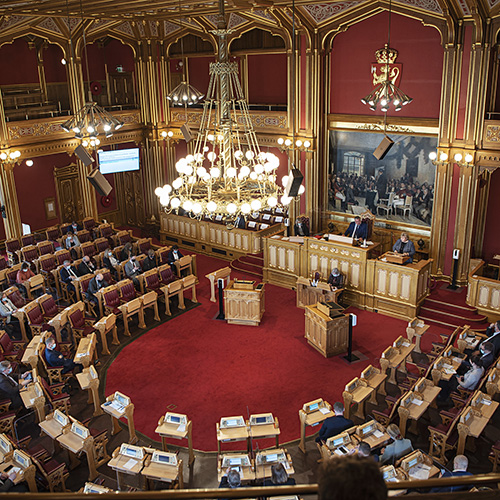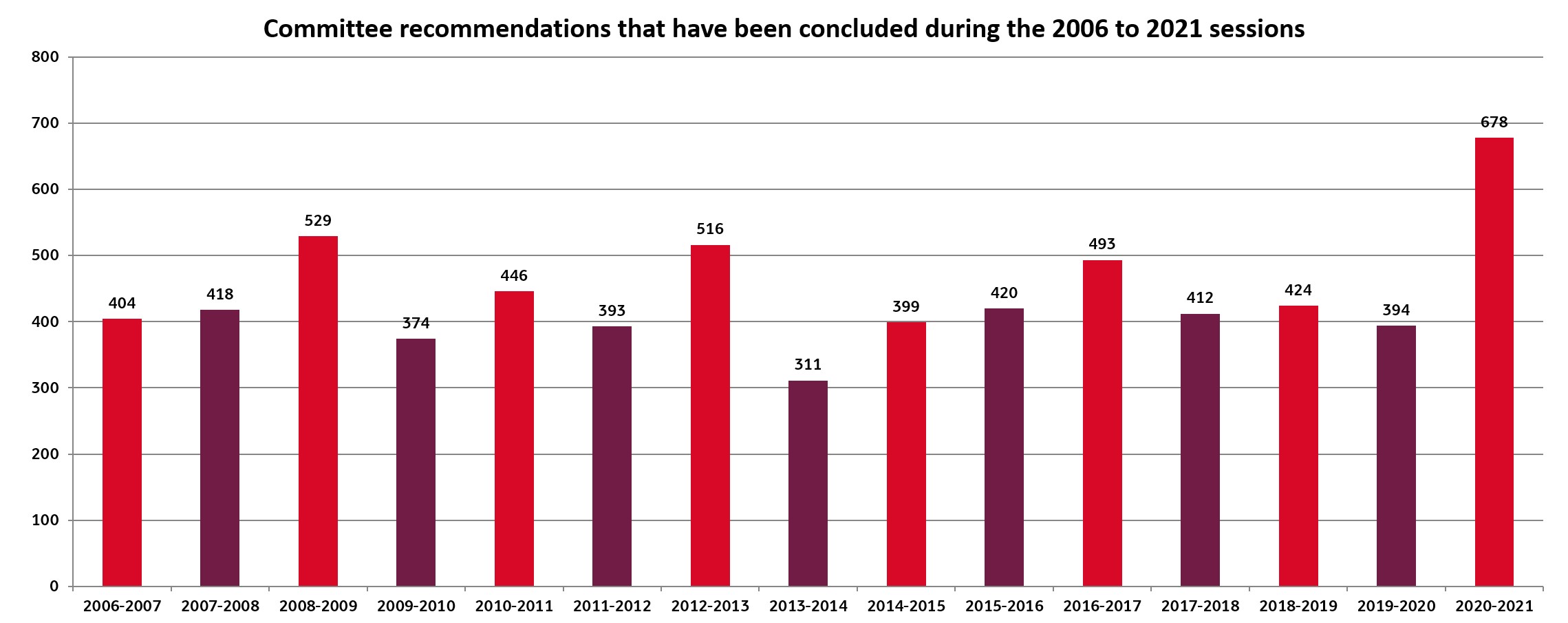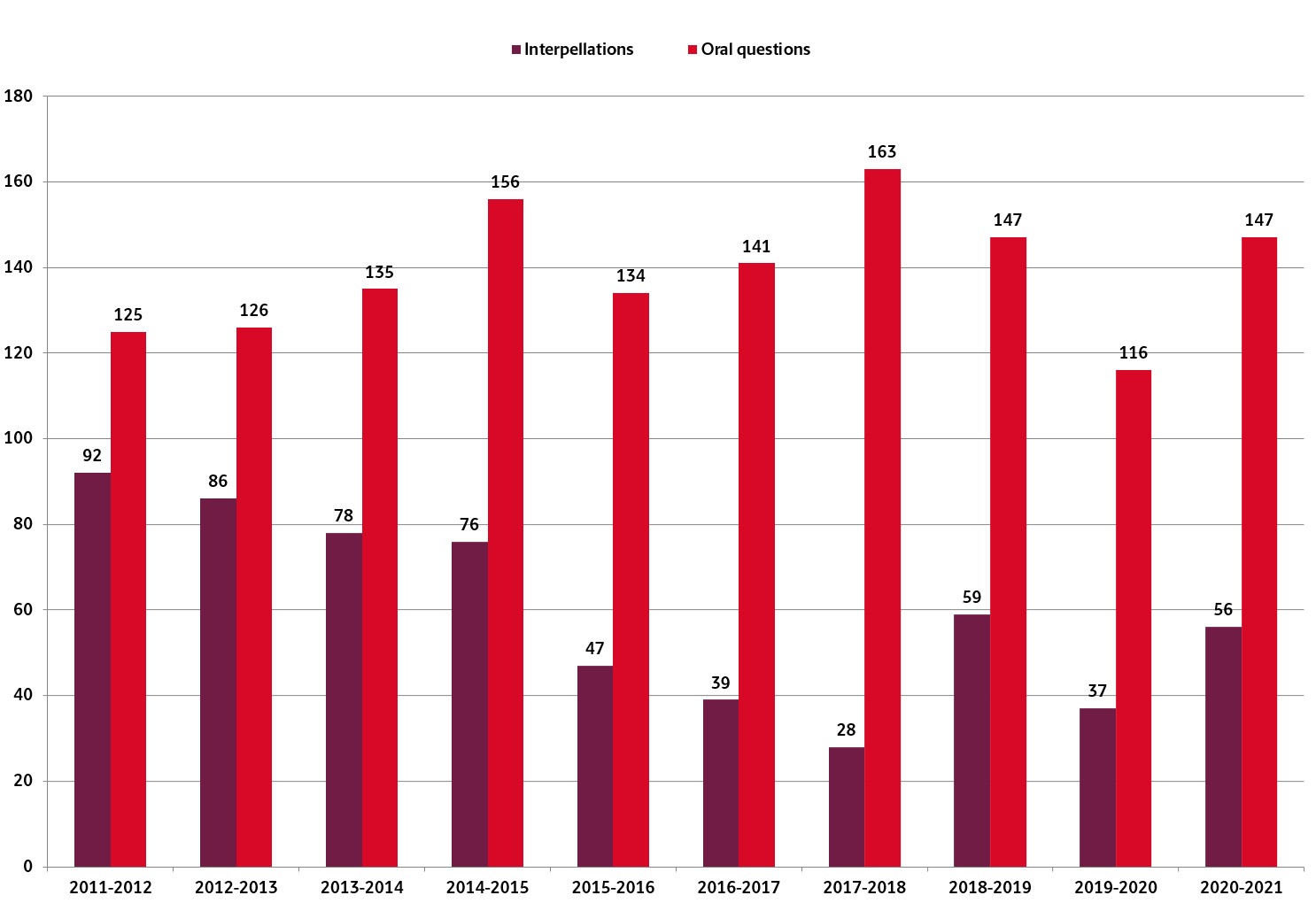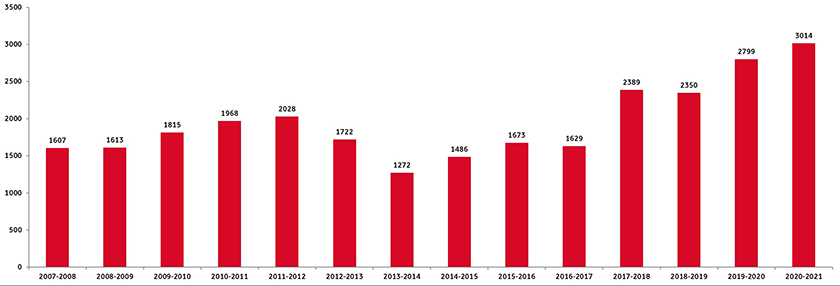The Storting’s work in facts and figures
Here are some key facts and figures from the 2020–2021 parliamentary session.

The Storting Chamber, 7th April 2021: Prime Minister Solberg informs Parliament about the Government’s step-by-step plans to ease COVID-19 infection control measures in Norway. Photo: Benjamin A. Ward/Storting.
During its 2020–2021 session, the fourth and final of the 2017–2021 parliamentary term, the Storting has had 105 sittings and considered 672 committee recommendations. The Members of Parliament (MPs) have asked the Government 3014 questions.
Storting sittings during the 2020–2021 session
The Presidium is responsible for fixing the Storting’s programme of sittings. Generally speaking, sittings take place on Tuesdays, Wednesdays and Thursdays. However, at particularly busy times, such as during the final weeks of the session, there will also be sittings on Mondays and Fridays. During the 2020–2021 session, there were 105 full sittings of Parliament. This is three more than the previous session.
Matters that have been concluded during the 2020–2021 session – a comparison with previous sessions
|
Category |
2015–2016 |
2016–2017 |
2017–2018 |
2018–2019 |
2019–2020 |
2020–2021 |
|
Propositions |
161 |
188 |
123 |
148 |
150 |
241 |
|
White papers |
39 |
49 |
22 |
27 |
29 |
46 |
|
Government statements |
9 |
12 |
16 |
15 |
14 |
21 |
|
Private Member’s motions |
126 |
195 |
206 |
169 |
137 |
356 |
|
Proposed amendments to the Constitution |
27 |
0 |
8 |
21 |
16 |
0 |
|
Document series* |
25 |
33 |
23 |
27 |
20 |
30 |
|
Other matters** |
27 |
18 |
39 |
23 |
26 |
22 |
|
Reports |
3 |
2 |
9 |
4 |
10 |
5 |
|
Total |
417 |
497 |
446 |
434 |
402 |
721 |
The Storting has dealt with 705 matters during the session. A sizeable proportion of these are government propositions and white papers. Such matters are normally sent to the standing committees for consideration before they are debated and, if necessary, voted on in the Chamber. The Storting has also considered matters that have originated in Parliament itself or in one of the external bodies connected to the Storting. Private Member’s motions make up the vast majority of these. The volume of such business has risen dramatically compared to the previous three sessions. The principal reason for this is the parliamentary situation that resulted from the Progress Party’s decision to leave the Government in January 2020.
*Including publications by external bodies connected to the Storting, such as the Office of the Auditor General.
**Including matters tabled by the Presidium, the Election Committee or matters initiated by the Standing Committee on Scrutiny and Constitutional Affairs.
Committee recommendations that have been concluded during the 2020–2021 session – a comparison with previous sessions

Most matters are dealt with by one of the standing committees, which then submits its recommendation. The graph shows the total number of committee recommendations during the 2020–2021 session compared with previous sessions. As we can see, there is a clear trend in which the number of recommendations gradually rises over the course of a four-year parliamentary term towards the next parliamentary election. The 2020–2021 session is well above the norm for the fourth session of a term.
Answered questions during the 2020–2021 session, divided by party and question type
One of the most important ways for the Storting to scrutinize the work of the Government is by asking questions. Not only do the questions enable Parliament to obtain information from the Government, but they also help to clarify the Government’s position on important political issues. A total of 3014 questions have so far been tabled during the 2020–2021 session. The table shows that the majority of parliamentary questions have been asked by the parties in opposition.
|
Party |
Main questions in oral Question Time |
Questions in ordinary Question Time |
Interpellations |
Written questions |
|
A |
48 |
62 |
11 |
913 |
|
Sp |
28 |
104 |
14 |
682 |
|
SV |
23 |
31 |
6 |
499 |
|
R |
5 |
7 |
3 |
83 |
|
MDG |
7 |
4 |
0 |
47 |
|
KrF |
0 |
0 |
1 |
10 |
|
V |
0 |
0 |
5 |
32 |
|
H |
0 |
0 |
9 |
36 |
|
FrP |
37 |
19 |
7 |
696 |
|
Independent |
0 |
0 |
0 |
16 |
|
Total |
148 |
227 |
56 |
3014 |
Total answered questions in oral Question Time and interpellations over time

An interpellation is a more extensive question to the Government. It will become the subject of a debate in the Storting. A question must be answered as quickly as possible, and no later than one month after it has been tabled. The reply is presented to the Storting during a so-called interpellation debate. The table shows that this method of asking the Government questions has become markedly less popular than asking questions in oral Question Time. That said, the number of interpellations has risen slightly during the past two sessions of the Storting.
Total number of written questions over time

Written questions provide MPs with the opportunity to ask short questions. These questions do not become the subject of a debate in the Storting. The relevant government minister must reply in writing to the MP who has asked the question within six working days. This is the most common way for MPs to ask the Government questions. The total number of written questions this session is a record high.
Source for all the facts and figures: the Storting’s electronic parliamentary documentation system (EPOS) via data.stortinget.no.
Please note that all the facts and figures are provisional and may be subject to change once quality assurance procedures have been completed.
Sist oppdatert: 28.10.2021 09:31